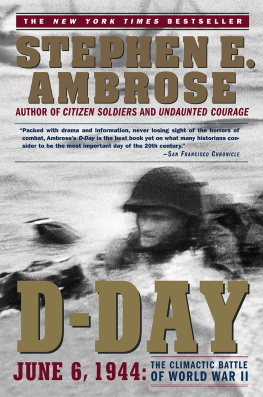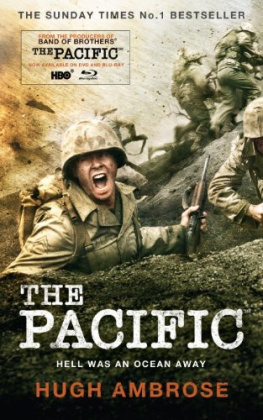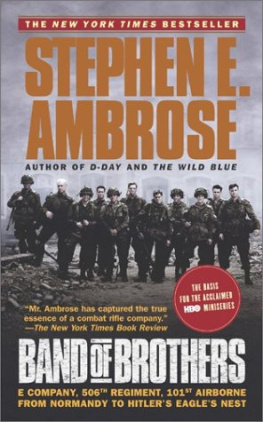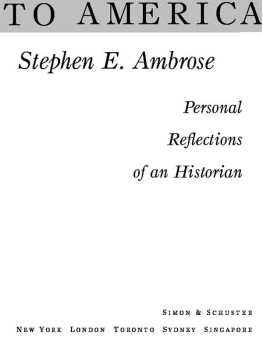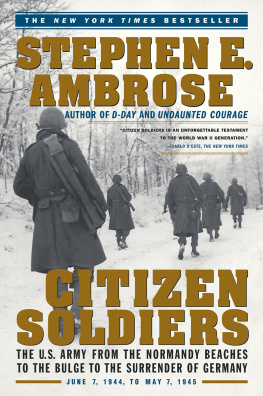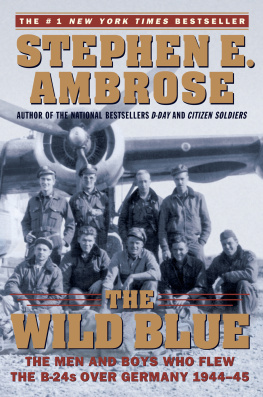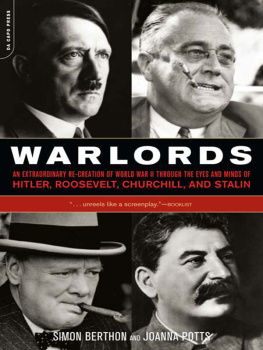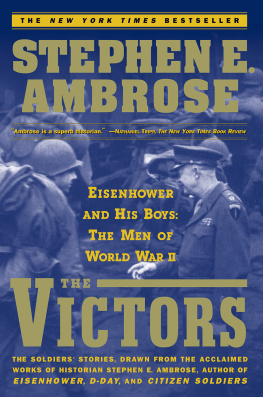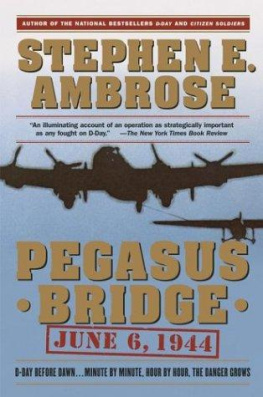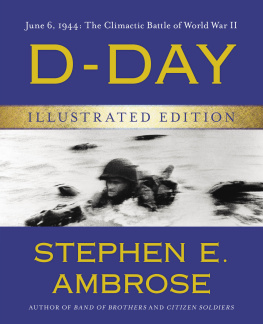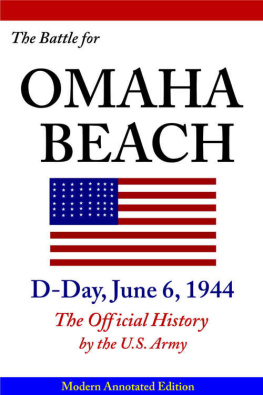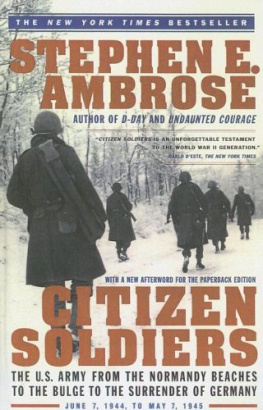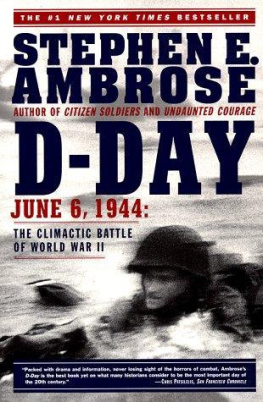Ambrose - D-Day, June 6, 1944: the climactic battle of World War II
Here you can read online Ambrose - D-Day, June 6, 1944: the climactic battle of World War II full text of the book (entire story) in english for free. Download pdf and epub, get meaning, cover and reviews about this ebook. City: United States;France;Normandy, year: 1994, publisher: Simon & Schuster, genre: History. Description of the work, (preface) as well as reviews are available. Best literature library LitArk.com created for fans of good reading and offers a wide selection of genres:
Romance novel
Science fiction
Adventure
Detective
Science
History
Home and family
Prose
Art
Politics
Computer
Non-fiction
Religion
Business
Children
Humor
Choose a favorite category and find really read worthwhile books. Enjoy immersion in the world of imagination, feel the emotions of the characters or learn something new for yourself, make an fascinating discovery.
D-Day, June 6, 1944: the climactic battle of World War II: summary, description and annotation
We offer to read an annotation, description, summary or preface (depends on what the author of the book "D-Day, June 6, 1944: the climactic battle of World War II" wrote himself). If you haven't found the necessary information about the book — write in the comments, we will try to find it.
Ambrose: author's other books
Who wrote D-Day, June 6, 1944: the climactic battle of World War II? Find out the surname, the name of the author of the book and a list of all author's works by series.
D-Day, June 6, 1944: the climactic battle of World War II — read online for free the complete book (whole text) full work
Below is the text of the book, divided by pages. System saving the place of the last page read, allows you to conveniently read the book "D-Day, June 6, 1944: the climactic battle of World War II" online for free, without having to search again every time where you left off. Put a bookmark, and you can go to the page where you finished reading at any time.
Font size:
Interval:
Bookmark:
Thank you for downloading this Simon & Schuster eBook.
Join our mailing list and get updates on new releases, deals, bonus content and other great books from Simon & Schuster.
C LICK H ERE T O S IGN U P
or visit us online to sign up at
eBookNews.SimonandSchuster.com

F OR F ORREST P OGUE, THE FIRST HISTORIAN OF D-D AY
The most difficult and complicated operation ever to take place.
W INSTON C HURCHILL
The destruction of the enemys landing is the sole decisive factor in the whole conduct of the war and hence in its final results.
A DOLF H ITLER
The history of war does not know of an undertaking comparable to it for breadth of conception, grandeur of scale, and mastery of execution.
J OSEPH S TAUN
Good Luck! And let us all beseech the blessing of Almighty God upon this great and noble undertaking.
D WIGHT D. E ISENHOWER ,
Order of the Day, June 4, 1944
In this column I want to tell you what the opening of the second front entailed, so that you can know and appreciate and forever be humbly grateful to those both dead and alive who did it for you.
E RNIE P YLE , June 12, 1944
Dr. Forrest Pogue began the process of collecting the oral histories of the men of D-Day on June 6, 1944. He was a sergeant (with a Ph.D. in history) serving with S. L. A. Marshalls team of historians in the Armys Historical Section, charged by Gen. George C. Marshall with collecting data from men of all ranks for an official history of the war. The team ultimately produced The U.S. Army in World War II (known as the Green Books from the color of the bindings), a series of scores of volumes known worldwide for accuracy and thoroughness. In 1954, Dr. Pogue published the penultimate volume in the ETO series, The Supreme Command, based on the documents generated by SHAEF and on interviews Pogue conducted with Eisenhower, Montgomery, and their principal subordinates. The Supreme Command is a genuinely great work, still the authoritative account.
But on D-Day, Dr. Pogue was working at the other end of the chain of command. He was on an LST serving as a hospital ship off Omaha Beach, interviewing wounded men about their experiences that morning. This was pioneering work in oral history; later Dr. Pogue was one of the founders of the Oral History Association.
Since I first began working for General Eisenhower as one of the editors of his wartime papers, Dr. Pogue has been my model, guide, and inspiration. He is important to my life, and to this book, in ways that go far beyond his publications (which include his four-volume, classic biography of Gen. George C. Marshall). For three decades he has been marvelously generous with his time and wisdom. At historical conferences, on eight long trips to Normandy and the other European battlefields, by correspondence and over the telephone, he has taught me and encouraged me in more ways than could ever be counted.
There are hundreds of young, and not so young, historians of World War II and of American foreign policy who are beholden to Dr. Pogue. He has brought up an entire generation of historians. His generosity with his time and knowledge goes far beyond the call of duty. To see him at a conference, surrounded by young historians and graduate students eager to hear and learn from him, is to see a great man doing great service. None of us can ever repay our debt to him, nor fully express our gratitude. He has touched our lives as a person and made us better at our craft. He is the first and the best historian of D-Day. That he has allowed me to dedicate this book to him fills me with pride and pleasure.
My interest in D-Day, first inspired by Dr. Pogues writing, was strengthened in 1959 when I read Cornelius Ryans The Longest Day. I thought then, and still do, that it was a superb account of the battle. Although I have developed some disagreements with Ryan over what happened on June 6, 1944, and have come to some different conclusions, I would be remiss if I failed to acknowledge my debt to his great work.
This book is based overwhelmingly on oral and written histories collected from the men of D-Day by the Eisenhower Center at the University of New Orleans over the past eleven years. The Center now has more than 1,380 accounts of personal experiences. This is the most extensive first-person, I-was-there collection of memoirs of a single battle in existence. Although space limitations made it impossible for me to quote directly from each oral history or written memoir, all the accounts contributed to my understanding of what happened. The contributors are listed in alphabetical order in Appendix A. To every man who contributed, I offer my deeply felt thanks.
Russell Miller of London has done extensive interviewing with British D-Day veterans. Student workers at the Eisenhower Center have transcribed some of his tapes, which he has graciously allowed me to use in this book. The Imperial War Museum in London has also provided tapes of the interviews the staff has done over the years, which have been transcribed by the Eisenhower Center. Andre Heintz has done interviews over the years with residents of the Calvados Coast; they are today in the Battle of Normandy Museum in Caen; he has kindly allowed me to use them for this book. The United States Army Military Institute at Carlisle Barracks, Pennsylvania, allowed me to use its extensive collection of interviews done by Forrest Pogue, Ken Heckler, and others, and its extensive manuscript holdings.
Phil Jutras, an American paratrooper who settled in Ste.-Mre-glise and who is the director of the Parachute Museum there, also collected oral histories from American veterans and from residents of Ste.-Mre-glise, which he has most generously donated to the Eisenhower Center and allowed me to use for this book.
Capt. Ron Drez, USMC, a rifle-company commander at Khe Sahn in 1968, is the assistant director of the Eisenhower Center. For nearly ten years he has been doing group and individual interviews at veterans reunions, in New Orleans and around the country. Because of his own distinguished combat record, he has excellent rapport with the D-Day veterans. He gets them to talking and reminiscing as few others can do. His contribution to this book is invaluable. Dr. Gnter Bischof, a native of Austria whose father was a Wehrmacht soldier and eventually a POW in America, is the associate director of the Center. He has done and is doing interviews with German veterans. His contribution is also invaluable. The Center is exceedingly lucky to have Drez and Bischof on the team.
Ms. Kathi Jones is the major force of the Eisenhower Center. Without her, none of us could do our work. She handles our correspondence, keeps the books, maintains our schedules, makes our appointments, runs our annual conferences, directs our student workers on their transcribing tasks, organizes the oral histories and memoirs, reaches out to the veterans, soothes damaged egos, and in general serves as our chief of staff. Her dedication to her work and her ability to keep our myriad of activities running smoothly are exemplary. She does all this, and more, without ever losing her temper or her good humor. Dwight Eisenhower once called Beetle Smith the perfect chief of staff. So say we of Kathi Jones.
Mrs. Carolyn Smith, secretary of the Eisenhower Center, along with student workers Marissa Ahmed, Maria Andara Romain, Tracy Hernandez, Jerri Bland, Scott Peebles, Peggy Iheme, Jogen Shukla, and Elena Marina, graduate students Jerry Strahan, Olga Ivanova, and Gunther Breaux, and volunteers Col. James Moulis, Mark Swango, C. W. Unangst, John Daniel, Joe Flynn, John Niskoch, Joe Molyson, Stephenie Ambrose Tubbs, and Edie Ambrose are all underpaid (or not paid at all) and overworked. They have stayed with it; without them there would be no Eisenhower Center, no oral history collection. The transcribers have had a terrible time with the names of French villages (as pronounced by American GIs) but they have persevered and triumphed. My debt to them is very great.
Next pageFont size:
Interval:
Bookmark:
Similar books «D-Day, June 6, 1944: the climactic battle of World War II»
Look at similar books to D-Day, June 6, 1944: the climactic battle of World War II. We have selected literature similar in name and meaning in the hope of providing readers with more options to find new, interesting, not yet read works.
Discussion, reviews of the book D-Day, June 6, 1944: the climactic battle of World War II and just readers' own opinions. Leave your comments, write what you think about the work, its meaning or the main characters. Specify what exactly you liked and what you didn't like, and why you think so.

